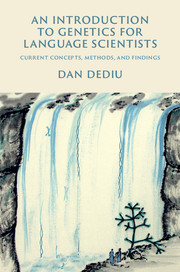Book contents
- Frontmatter
- Dedication
- Contents
- List of illustrations
- Acknowledgements
- 1 Introduction
- 2 Nature, nurture, and heritability
- 3 The molecular bases of genetics
- 4 Effects of genes on phenotype
- 5 Linkage disequilibrium and its role in finding genes
- 6 What do genes actually do?
- 7 The way forward: exome and genome sequencing
- 8 Population and evolutionary genetics
- 9 Interactions between genetic and cultural evolution
- 10 Conclusions, topics not covered, future directions
- Appendix The computer code
- References
- Index
- Glossary
2 - Nature, nurture, and heritability
Published online by Cambridge University Press: 05 April 2015
- Frontmatter
- Dedication
- Contents
- List of illustrations
- Acknowledgements
- 1 Introduction
- 2 Nature, nurture, and heritability
- 3 The molecular bases of genetics
- 4 Effects of genes on phenotype
- 5 Linkage disequilibrium and its role in finding genes
- 6 What do genes actually do?
- 7 The way forward: exome and genome sequencing
- 8 Population and evolutionary genetics
- 9 Interactions between genetic and cultural evolution
- 10 Conclusions, topics not covered, future directions
- Appendix The computer code
- References
- Index
- Glossary
Summary
In this chapter we approach, at a fairly abstract level, the fundamental questions concerning the relationships between the phenotype (the observable properties of individuals), the genotype and the environment. We discuss the paramount importance of variation in studying these relationships and we define, estimate and discuss the meanings and misinterpretations of heritability. Far from being a simple concept, heritability will turn out to have some non-intuitive properties that make the interpretation of heritability estimates quite a tricky exercise. Likewise, we will discover that, in fact, all the related concepts and distinctions, such as innate and acquired, or nature and nurture, are fuzzy and far from their apparent clarity in everyday discourse. We will end with a very brief survey of heritability studies in speech and language. This chapter also introduces several fundamental concepts of statistics that are necessary for a proper understanding of many topics covered in this book.
Phenotype, genotype and environment
It is unquestionable that both “nature” and “nurture” are required for the development of a linguistic human being. Lacking “nature” will limit language development no matter how much “nurture” there might be, as many a pet owner can easily confirm. This is seemingly supported by studies of chimps (such as Nim Chimpsky and Washoe) reared in conditions similar to those experienced by human babies and infants, but which nevertheless fail to go beyond a rather limited level of language usage. On the other hand, having “nature” but lacking “nurture” is equally devastating, as shown by the cases of children who, for various reasons, have not been exposed to language during the so-called critical period for language acquisition (a well-known case being Genie) and who fail to develop full-blown language despite considerable efforts.
Thus, if we denote, in a highly abstract manner, the “nature” as G (from genetics) and the “nurture” as E (for environment), then we can attempt to write down a symbolic equation describing how these two factors relate and interact in producing the phenomenon of interest, P (for phenotype).
- Type
- Chapter
- Information
- An Introduction to Genetics for Language ScientistsCurrent Concepts, Methods, and Findings, pp. 7 - 43Publisher: Cambridge University PressPrint publication year: 2015



